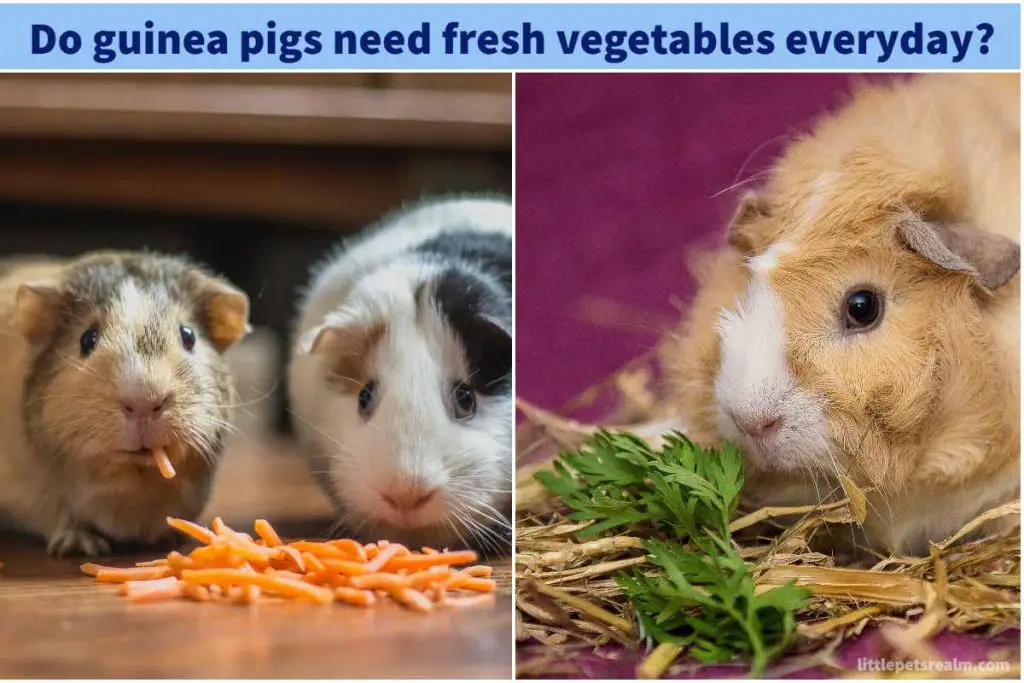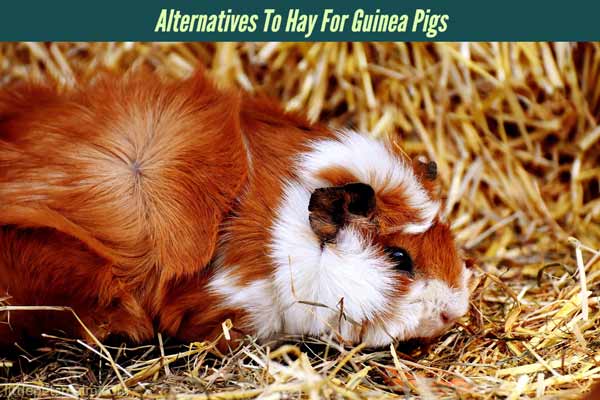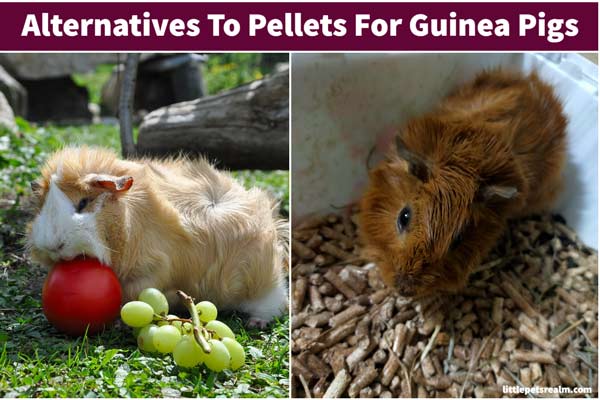You need to provide healthy food to provide your guinea pigs nutrition. Vegetables are very important for guinea pigs. But, Do guinea pigs need fresh vegetables everyday?
A guinea pig needs 1-2 cups of fresh vegetables every day to maintain vitamins and minerals in its body. However, you may leave them without vegetables for one day or two occasionally, if you can’t offer them veggies for some reason. But, make sure that they get pellets instead of vegetables. Moreover, you have to give them unlimited hay which is their primary food.
Now, you may ask, how long a guinea pig may live without veggies and which vegetables can you feed them every day?
Let’s know about that.
Table of Contents
How long can guinea pigs go without vegetables?

Guinea pigs can go 2-3 days or more without any vegetables if you replace vegetables with pellets and give them unlimited hay as well. Not eating vegetables daily won’t kill your guinea pigs or cause any problems. But, in the long run, it will cause various health issues.
So, you should feed them vegetables every day to make them healthy and disease-free.
In many pet stores, guinea pigs don’t get vegetables regularly, sometimes more than 3 days without having any complications.
If you are planning to do the same thing with your little piggies you are wrong. Though guinea pigs may not have to face any immediate problems, this can lead to weakness and various illnesses in the future because of vitamins and mineral deficiency.
You adopt the little piggies for their better life. So, you should take care of their health and provide them with a quality life.
Why do you need to feed guinea pigs vegetables everyday?
Let’s know about the reasons for which you have to feed your piggies vegetables every day.
Not manufacturing of vitamin C in guinea pig’s body
One of the most important causes for offering your guinea pigs vegetables is Vitamin C. Their body can’t synthesize vitamin C.
So, it’s essential to provide them with Vitamin C from an external source. If you can’t give vitamin C regularly, they will develop Vitamin C deficiency disease, called scurvy.
This will lead to serious bone, teeth, and blood vessel complications. It’s also fatal. Green leafy vegetables are rich in Vitamin C that should feed them every day to prevent this from happening.
Guinea pig’s preference
Guinea pig’s like natural foods more than anything because of their wild nature. So, if you want to replace veggies with pellets, you should know what they want to eat. Yes, you can provide pellets, but you have to ensure veggies every day to make them happy.
Providing vitamins
Guinea pigs not only need Vitamin C, but also other vitamins as well to maintain their body and be free from disease. Vitamin D is also very important as they can’t produce it on their own.
Sunlight helps synthesize Vitamin D. But if you don’t take your piggies outside regularly, you have to feed them veggies that contain Vitamin D.
Offering minerals
Vegetables provide guinea pigs with a lot of minerals that they require. It may not be achieved by other artificial foods.
Preventing various diseases
If you feed your guinea pigs different vegetables daily and ensure all essential nutrients, it will help prevent and fight against various diseases.
Vitamin C prevents scurvy, omega 3 fatty acids improve heart health, and omega 6 fatty acid prevents skin diseases. These are a few examples. Just like those veggies help keep them disease-free.
Maintaining nutritional balance
Guinea pigs can’t be healthy and disease-free if you give them one or two nutrients every day. They require a lot of nutrients just like a human being. Feeding a variety of vegetables daily can help maintain a good nutritional balance.
Enhancing immunity
Vegetables are packed with a lot of vitamins and minerals that help boost the immunity of little piggies.
What vegetables can guinea pigs eat every day?
Guinea pigs need fresh and green leafy vegetables daily to maintain nutritional balance. But, don’t provide the same vegetables every day as it can cause digestive problems and they may not like it as well. Instead of that, ensure the nutritional value of veggies.
It should contain vitamin C that they can’t produce in their body. If you don’t take your guinea pigs outside, you should give them food containing vitamin C.
Calcium is also required for their health. But, don’t feed veggies containing too much calcium, oxalate, and phosphorus, as it causes bladder stones.
Avoid vegetables as well as fruits that contain high amounts of sugar which are bad for their health.
Here is the list of vegetables from which you can choose a few to feed your guinea pigs every day:
Zucchini
Zucchini is packed with a good amount of Vitamin C and other important vitamins and minerals. You can feed your guinea pig zucchini every day if you offer it in limited quantities.
If they eat excessive amounts of zucchini, it will cause digestion problems, like bloating and diarrhea.
Bell peppers
Bell peppers are rich in Vitamin C. It also offers a good amount of Vitamin A and fibers. To meet the requirement of vitamin C, you should feed them bell peppers of any color.
Though different colors contain different nutrients, vitamin C is almost the same in them. You can feed your guinea pigs green or red bell paper ⅛ cup daily.
Romaine lettuce
Romaine lettuce has a higher nutritional value than iceberg lettuce. Iceberg lettuce doesn’t have many health benefits and may cause diarrhea and digestive issues. So, go with white romaine lettuce.
But, don’t feed too much of it. It contains calcium that can lead to bladder stones. So, it’s better not to feed it daily.
Broccoli spears
You can give your guinea pig raw broccoli spears every day if it doesn’t cause any problems. It’s rich in vitamins and minerals. However, it may cause bloating or diarrhea sometimes when you use it regularly to feed them.
Moreover, it contains a high amount of vitamin A, and calcium which is good if you give in an adequate amount, but can be dangerous if they eat a lot. So, offer them 2-3 times a week.
Peas
A good amount of calcium, phosphorus, and vitamin C is present in peas. As it contains calcium, too much of it can cause bladder stones.
Belgian Endive
Belgian Endive contains a lot of nutrients. It also supports bones and improves eyesight. Belgian Endive also helps your guinea pigs maintain blood sugar levels. Many suggest providing this every day. But, you should offer them 3-4 times a week due to high calcium levels.
Spinach
Your guinea pig gets a lot of vitamin C and vitamin A from spinach. However, it contains calcium and oxalate. So, excess of it can cause bladder stones.
Kale
Kale is rich in Vitamin C, vitamin A and other antioxidants that are essential for your piggies. But, if you feed them kale every day and in a high volume, it can cause bladder stones due to calcium and phosphorus present within it.
Tomatoes
Tomatoes are packed with essential nutrients including vitamin C. But, be aware of the stems or leaves, as it’s poisonous to guinea pigs. Moreover, tomatoes contain acids that may cause sores if you feed them a lot. So, provide tomatoes 1-2 times a week.
Cabbage
It’s also a great source of vitamin C. But, you have to be careful that they eat cabbage excessively, as it can cause gas and bloat.
Carrots
Carrots contain a good amount of vitamin A. You can provide them with both carrots and carrots green. However, don’t feed carrots too much as it can lead to serious complications.
It contains sugars that can be bad for their dental health as well as cause diabetes. So, offer your guinea pig carrots with a minimal amount once or twice a week.
Cucumber
Cucumbers help your guinea pigs lose weight if they are overweight. However, you should avoid feeding it regularly to prevent diarrhea.
Other dark green veggies
Those veggies are a good source of vitamin C and fibers that can boost your piggies’ immunity. But, make sure that veggies are safe for their health.
How much vegetables do guinea pigs need a day?
You should feed your guinea pig 1-2 cups of vegetables daily once a day or two divided meals along with their unlimited hay. A guinea pig needs at least 1/2 – 1 cup or 110 – 150 grams of green leafy vegetables once a day containing vitamin C, as their body can’t manufacture vitamin C. A good mix of vegetables provides your guinea pigs with all essential nutrients and prevents digestion problems.
You can choose leafy vegetables and 2-4 other fresh veggies to make a good mix. It ensures a balanced diet. Making a coleslaw mixing different vegetables and fruits is also a great idea.
Why does your guinea pig not eat vegetables?
Usually, guinea pigs love natural foods such as fresh vegetables. But, they may not eat vegetables if you offer them at the wrong time.
Maybe they are full or they eat a lot of pellets or treats. So, offer them vegetables at the right time and avoid providing them treats frequently.
How to serve vegetables to guinea pigs?
You shouldn’t serve cooked vegetables to your guinea pigs, as their body supports raw veggies. Besides, try to avoid cold vegetables that can be bad for their health. Wash the vegetables with water and cut them into small pieces before you serve them. You should serve veggies in a clean food bowl.
Don’t provide them with wilted or spoiled veggies. Besides, make sure the veggies don’t contain any pesticides or harmful chemicals for your guinea pigs.
How to store vegetables for guinea pigs?
You have to store vegetables for guinea pigs in a sealed container or leave it in the fridge in summer. If you see vegetables aren’t fresh, don’t provide those to the piggies.
What can I feed instead of vegetables to your guinea pigs?
If you run out of vegetables or you can’t provide enough vegetables to your guinea pigs, you can feed them pellets. Pellets contain vitamins, minerals, and other essential nutrients that vegetables offer. However, you should try to feed your guinea pigs vegetables sometimes or as much as you can provide, because natural foods are great for their health.
Check out more alternative food ideas for guinea pigs.
Takeaways
It’s recommended to feed guinea pigs fresh veggies daily to provide them vitamins such as vitamin C and minerals. However, they may go without veggies for 2-3 days if you provide hay, water, and essential foods such as pellets regularly. But, try your best to prevent it from happening or they will get sick and weak.

I am Pallab Kishore, owner of Little Pets Realm. I share important tips, advice and answer all the queries to solve various problems about small pets such as guinea pigs and hamsters on this website.



